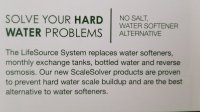uscpsycho
Member
Does anyone have an opinion on whole home water filtration by Lifesource? I searched the forum and was surprised to find very few mentions.
For those not familiar with the company, I'm considering this filtration and softening system.
My plumber likes the system and has it himself (although he got a significant discount). But he is a sample size of one. Online reviews, if they are to believed, are quite positive. But I'd like more feedback from people with their feet on the ground and experience with this. It's a big investment...
If Lifesource isn't recommended, what whole home water system would you recommend? I want something that is salt free and (mostly) maintenance free. If it makes any difference I am in Los Angeles.
For those not familiar with the company, I'm considering this filtration and softening system.
My plumber likes the system and has it himself (although he got a significant discount). But he is a sample size of one. Online reviews, if they are to believed, are quite positive. But I'd like more feedback from people with their feet on the ground and experience with this. It's a big investment...
If Lifesource isn't recommended, what whole home water system would you recommend? I want something that is salt free and (mostly) maintenance free. If it makes any difference I am in Los Angeles.

